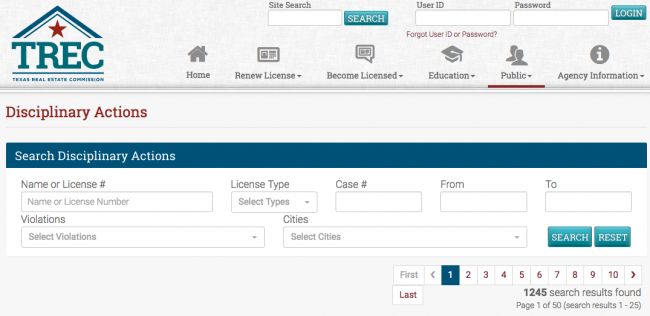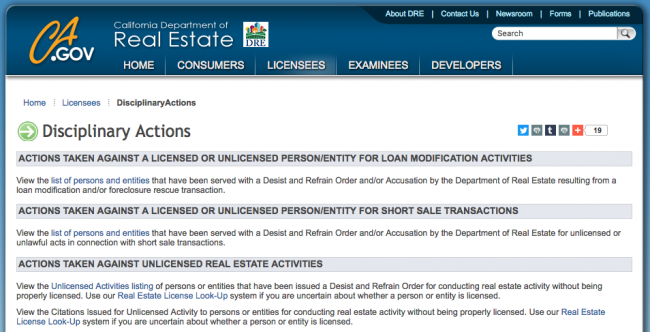New York State has a remarkably unwieldy system for recording disciplinary actions against real estate brokers, with low usability and confusing organization. But how much better are other states doing? The answer, it turns out, is a lot.
In an analysis of equivalent public disclosure systems in six U.S. states with major real estate markets – California, New York, Florida, Texas, New Jersey and Illinois – the New York Department of State’s “Decision and Consent Orders” search engine was found to be the worst by far.

In the five other states examined, publicly-accessible disciplinary action records provide consumers with a variety of useful features, such as 1) periodic reports of recent disciplinary actions, 2) disciplinary histories for individual brokers, or even 3) the ability to search for violations by various criteria. New York’s DOS provides none of the above.
“Based on states like California and Texas, New York clearly can do a better job in protecting consumers from unscrupulous real estate agents,” said Brad Hoylman, the State Senator for District 27 in New York. “New Yorkers should have access to an easily navigable online database of disciplinary actions against brokers to help them make informed decisions on one of the most important decisions of their lives, the purchase of a home.”
In New York state, the licensing of real estate brokers is administered by the DOS, whose Division of Licensing Services regulates a variety of occupations, including nail salon technicians, security guards and notaries public. By contrast, most other states surveyed had agencies or divisions dedicated to the real estate industry alone, such as the Real Estate Commissions of Texas, Florida and New Jersey, or California’s Department of Real Estate.
These are the state-level systems for finding information about real estate broker violations in the nation’s largest real estate markets, ranked by functionality and ease of use:
1. Texas (Texas Real Estate Commission)

Texas was only state examined which provided a flexible search engine for consumers, allowing users to construct custom queries using various criteria.
With records of about 1,000 disciplinary actions taken against brokers and sales agents from 2007 to the present (and more actions against home inspectors and instructors as well), TREC’s disciplinary action search allows users to search for violations in a specific city, date range, or violation type, as well as searching for individual brokers and cases. For many cases, the relevant documents may also be viewed directly in the search results, though others require freedom of information requests.
2. California (Department of Real Estate)

Although lacking the full flexibility offered by Texas’ interface, California’s Department of Real Estate addresses common consumer queries by providing lists of actions categorized by violation type, such as loan modification, short sale transactions, or unlicensed activity, accompanied by the relevant documents in many cases. Additionally, the department provides monthly summaries of enforcement actions for each individual month from March 2010 to the present, covering a whopping 9,781 separate actions – perhaps not too surprising for the nation’s largest real estate market.
3-5. (tie) Florida (Real Estate Commission), New Jersey (Real Estate Commission), Illinois (Department of Financial and Professional Regulation)
These three states provide monthly (NJ and IL) or annual (FL) reports on disciplinary actions, but little else in terms of search functionality, such as the ability to search by city or violation type. In Florida and Illinois, information about a licensee’s disciplinary history can also be found by searching for that individual licensee.
Florida’s records include over 2,000 actions taken from 2005 to 2016, hence losing points for the lack of data on 2017 and 2018.
Illinois’ records include over 1,600 real estate actions from 2007 to the present, losing points because they are mixed in with various other types of licensees. New Jersey’s records cover over 500 disciplinary actions against brokers from 1996 to the present.
6. New York (Department of State, Division of Licensing Services/Office of Administrative Hearings)
The many inadequacies of New York State’s broker violation disclosure have already been detailed in depth. While New York does provide access to original administrative documents, which is not something all other states do, in New York’s case these raw documents are the only thing available for examination, with minimal effort put into classification, summarization or organization.
New York state’s disciplinary records contain around 1,300 decisions against real estate brokers dating from the 1990s to the present, as well as 194 consent orders. (The exact number of real estate decisions is hard to establish due to the inconsistent classification of documents.)
Even within the state, the New York Department of State’s system compares poorly to other state agencies with similar responsibilities. Like the DOS, the New York State Education Department (NYSED) is responsible for disciplinary actions against practitioners of a variety of occupations, from accountants to veterinarians, and provides a website where consumers can look up this information.
NYSED’s Enforcement Actions page allows users to efficiently search through over 12,000 actions from 1994 to the present, by name or by month and profession, and view summaries of violations and actions taken. Nothing fancy, but still a level of organization that the DOS’ site doesn’t come close to matching.
In previous comments, the DOS has defended its public record-keeping practices by pointing out that members of the public can file Freedom of Information Law (FOIL) requests for information on disciplinary actions. However, as of the writing of this article, FOIL requests for such information filed by TRD in late May have yet to be fulfilled, as the expected response date has been extended repeatedly.
Other DOS departments appear to face similar challenges with timely public disclosure. In a recent attempt to acquire copies of limited liability company filing documents from the DOS’ Division of Corporations, TRD learned that the average turnaround time for such requests – which can only be submitted by fax, not online or by phone or email – is one week. Members of the public may pay for expedited service, but there is no way to inquire on the status of such requests except by checking if your credit card has been charged.
